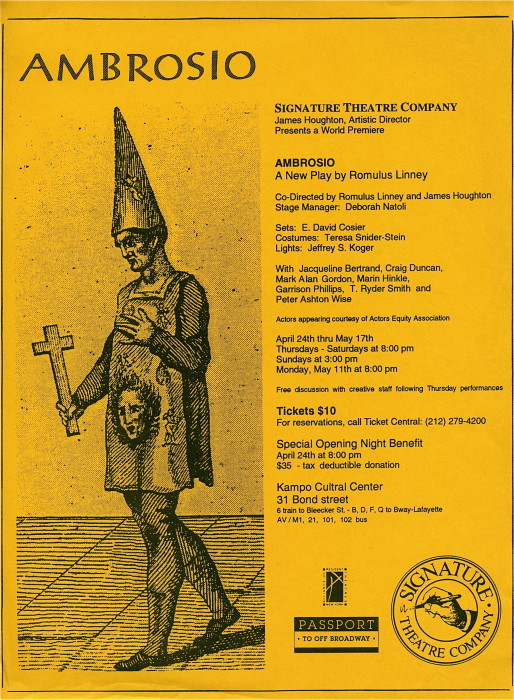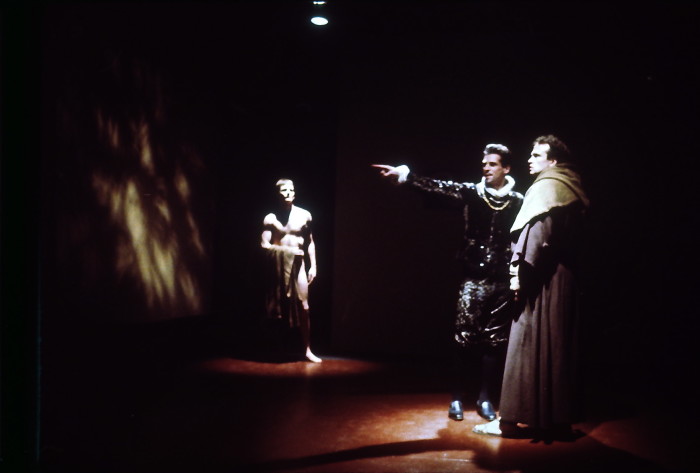
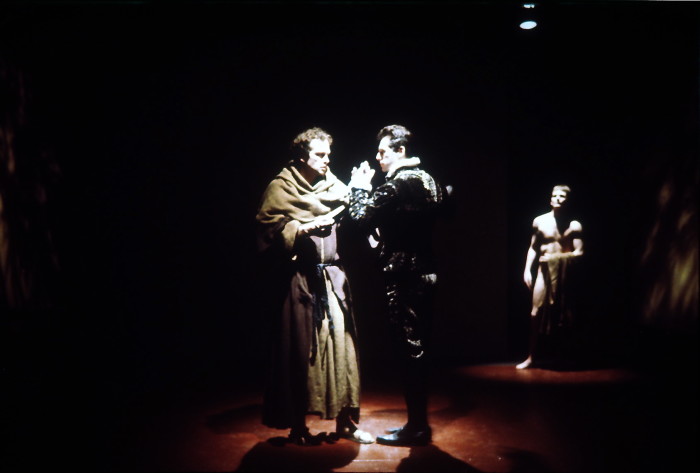
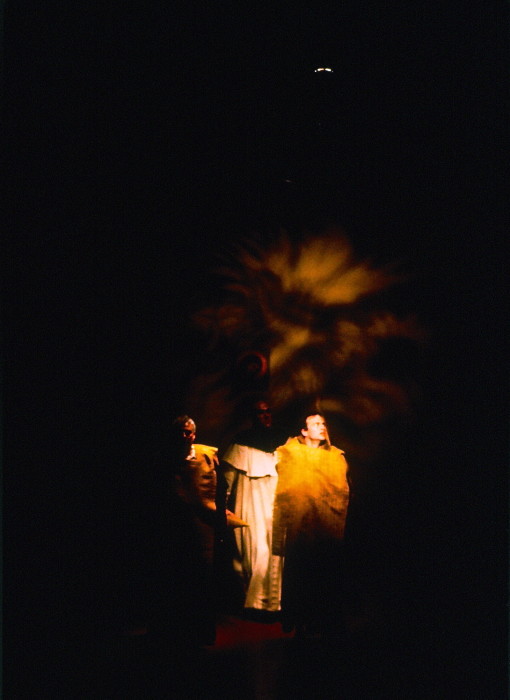
Excerpts from the reviews
“Probes deeply into the nature of heresy and the power of love, both spiritual and temporal . . . a quietly intense chamber piece that keeps a sharp focus on its central subject at the same time that it widens its lens to include the background of a demoralizing society . . . the final production in the first season of the Signature Theater Company, it validates the premise behind the formation of the troupe. In the course of a single year, this enterprising company has devoted itself entirely to plays by Mr. Linney: revivals, revisions, the New York premiere . . . and now a new play that ranks with the author’s most challenging dramatic works.” – Mel Gussow, The New York Times
“The telling is fascinating . . . Skillfully co-directed . . . An excellent cast . . . T. Ryder Smith, all unctuous good manners, wisely underplays the destructive intent of the manipulative Don Pedro . . . Linney is an outstanding writer.” – Michael Sander, Drama-Logue
Publicity
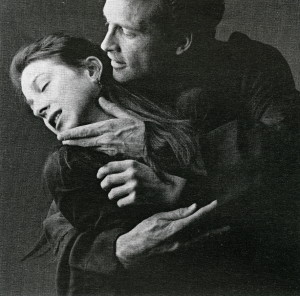
Full reviews
New York Times, Mel Gussow – Hypocrisy and Dissent In an Unenlightened Age . In “Ambrosio,” Romulus Linney probes deeply into the nature of heresy and the power of love, both spiritual and temporal. Always a rapt student of history, he uses a seismic event in the past, the Spanish Inquisition, as a sounding board for his provocative thoughts on what drives people to irrational acts and crimes of passion. At the same time, the playwright never ignores his role as storyteller. “Ambrosio,” the final production in the first season of the Signature Theater Company, validates the premise behind the formation of the troupe. In the course of a single year, this enterprising company has devoted itself entirely to plays by Mr. Linney: revivals, revisions, the New York premiere of “A Woman Without a Name” and now a new play that ranks with the author’s most challenging dramatic works. In a taut 90 minutes, Mr. Linney demonstrates the crushing weight of the Inquisition, as it destroys dissent and raises hypocrisy to lofty heights. Abhorrent actions are followed by the prayerful words “with God, with God.” From the author’s critical perspective, it is not God but the Devil that is the primary force in Spain in 1500, but the answers to questions of diabolism are wisely left to a theatergoer’s imagination. The play is written with the utmost economy. As with the author’s earlier historical efforts, beginning with “The Sorrows of Frederick,” the new work is the antithesis of self-important epics that subordinate meaning to panoply and melodrama. “Ambrosio” is a quietly intense chamber piece that keeps a sharp focus on its central subject at the same time that it widens its lens to include the background of a demoralizing society. Throughout the play, there are alternating currents of rapture and retribution, as a charismatic priest, Father Ambrosio (Peter Ashton Wise), is overcome by temptations. The sanctity of his cloistered life in an abbey is suddenly invaded by a longing for two people: a lovely young woman (Marin Hinkle), for whom he acts as confessor, and a mysterious monk (Craig Duncan). The characters are clearly individualized and also represent divergent attitudes toward conflicts between church and state. The Inquisitor turns out to be a surprisingly judicious man, insisting on differentiating among sins, declaring that certain acts demonstrate “vanity, lunacy and lust, but not heresy.” To provide additional historical perspective, the author makes a passing reference to Martin Luther as a rising young man of the church. While remaining scrupulously within its period, “Ambrosio” also raises relevant arguments about other more modern times of non-enlightenment. As directed by Mr. Linney and James Houghton, the actors evoke their characters in appearance as well as sensibility. Playing the seductive monk, Mr. Duncan has the look and the innocence of the boy in Picasso’s portrait “Boy Leading a Horse.” Similarly, T. Ryder Smith, through his invidious manner, underscores the diabolic nature of his character. Moving from abject admiration for the priest to sudden moments of passion, Ms. Hinkle turns her confessional into a dream of lustful abandon. In his New York debut, Mr. Wise takes an understated approach to his role. While not soliciting sympathy, he elicits curiosity, entreating the audience into his nightmare and the contradictions of a man enthralled. The set design by E. David Cosier makes harmonious use of sparse scenery and slide projections, and Teresa Snider-Stein’s costumes add authenticity. With its intelligence and acuity about crises of faith, “Ambrosio” is a play that would honor any of our major theaters. That it happens to have its first production in the unpretentious surroundings of the Signature Company reinforces Mr. Linney’s commitment to theater as an arena for the exploration of ideas. 4.28.92
[previous] [next]
